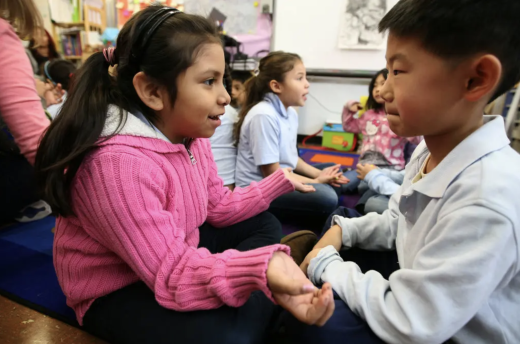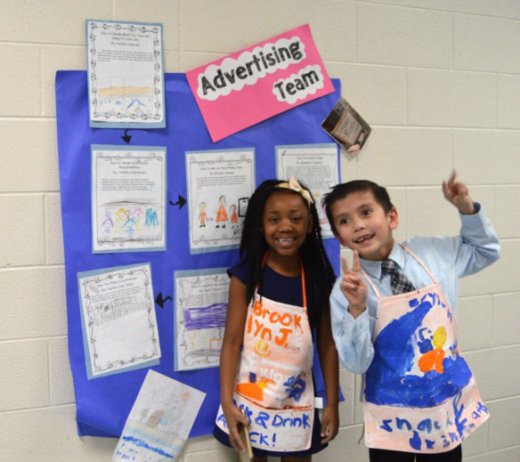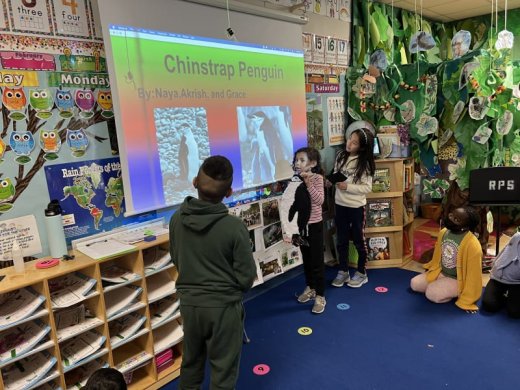Overview Link to this section

We each develop at our own pace, so it's impossible to tell exactly when a particular student will reach a specific milestone or learn a given skill. The developmental milestones below will give you a general idea of the changes you can expect as each seven and eight-year-old gets older, but don't be alarmed as each student takes a slightly different course. Honor where they are and support them as they develop.
Seven
Link to this section
Physical Development
-

- Improved coordination for both gross and fine motor skills
- More coordinated with throwing, catching, and other foundational movement skills than at younger ages
- Muscles sometimes are tense; they often hold pencil near the point with a three-fingered, pencil-like grasp that they find difficult to relax
- Anchor their printing and drawing to the baseline; find filling up the line space difficult
- Increased ability to focus on objects nearby; often focus on a small, close area; writing, drawing, and numbers are tidy and small, if not microscopic
- Work with head down on the desk, often covering or closing one eye
- Can be sensitive to many physical and psychosomatic hurts
- Often prefer video or online games to physical activity, though still enjoy imaginary adventures outdoors
Social & Emotional Development
-

- Often have a best friend, although their best friend might frequently change
- Prefer working and playing alone or with one friend; enjoy one-on-one conversations and like to send notes
- Changeable; sometimes moody or potty; may worry that "Nobody likes me!"
- Needs security, structure, and stability; can be upset by changes in room arrangement or scheduling
- Will rely on adults for help and constant reassurance
- Extremely loyal to the classroom teacher; need teachers to prepare them in advance for substitutes
- Conscientious and serious about their school work for the most part; don't like taking risks or making mistakes; can get sick from worrying about tests, assignments, etc
- Have strong likes and dislikes
- Demonstrate a desire to keep things new and tidy
- Playground games such as jump rope, foursquare, and hop-scotch are more popular than team or large-group activities, although imaginary play remains strong
- Having a strong sense of right and wrong, and concern for others leads them to sometimes tell students about classmates' behaviors
Communication & Language

- Listen as well and speak precisely
- Rapidly develop their vocabularies; sevens love to keep notebooks of their new words
- Shows great interest in the meanings of words
- Secret codes, Morse code, and similar language play can engage children at this age
Cognitive Development

- Like to repeat tasks; like to review learning verbally or frequently touch base in other ways with their teacher
- Weekly spelling and vocabulary lists and short tests are enjoyable for students
- Like to work slowly and finish what they start; appreciate a "heads-up" that it's time to prepare for transitions; may find timed tests especially troublesome
- Bothered by mistakes and try hard to make their work perfect
- Enjoy inquiry activities and hands-on exploration, often work well in "discovery" centers
- Like to collect, sort, and classify
- Still like to be read chapter books by teachers and parents
- Enjoy board games as well as computer games; especially enjoy playing games with one other person
- Increasingly able to share what they are learning and how they feel about it through verbal, written, and artistic reflections
- Need support for sustained, quiet work periods
- Enjoy memorization of poems, songs, chants, and cheers
- Comfortable with emphasis on high-quality products and proper display of work; able to accept feedback and revise work
- A few students are still not fully able to read without vocalizing; still sometimes whisper to themselves during "silent" reading
Reading, Writing, & Across The Curriculum
Reading - Provide opportunities for children this age to:

- Have time for individual reading
- Continue phonics work; children thrive on intense phonics instruction in small groups
- Do written reading comprehension assignments that are short and pithy; better to have students complete two or three questions thoroughly than answer many test-like comprehension practice sheets
Writing - Expect from children this age:
- Writing: Longer stories with a beginning, middle, and end, including "chapter" books in some cases; great interest in the storyline; tendency to include lots of detail; writing before drawing and sometimes even writing without drawing; readiness to begin nonfiction writing as a way to show learning from science or social studies investigations
- Spelling: Correct spelling slowly emerging from transitional spelling; increased phonetic and sight word fluency; ease in learning capitalization and punctuation; readiness for formal spelling program
- Writing Themes: Family and friends; sleeping over; losing teeth; pets (often including stories about the death of a pet); nightmares; worries about the death of family members, illness, war, famine, or other serious issues
- Handwriting: Letters are often microscopic in size
Across the Curriculum - Provide opportunities for children this age to:
- Use programs such as Seesaw to show what they have learned
- With support, take photos to incorporate into reports or class books
- Have choices in how they represent their learning
- Take things apart and discover how they work; sort and classify things like buttons, pictures, leaves, shapes
- Expand vocabulary in all subject areas
- Play games and tell jokes as a way to moderate their seriousness
- Work with one partner rather than just groups
Eight
Link to this section
Physical Development

- Restless, full of energy, and often in a hurry; need physical release through outdoor play, and love group playground games such as Capture the Flag or Freeze Tag
- Play hard and tired quickly; do better with several short play breaks versus one long break
- Growth spurts lead to some awkwardness in coordination
- Eyes focus well on objects near and far
- Better control of hands; can learn and use cursive writing if it's being taught
- Many using adult pencil grasp; some still need a pencil grip
Social & Emotional Development
-

- Love to share humor ("Have you heard the one about...?")
- Love group activities and cooperative work; work best in groups that teachers change frequently throughout the year
- Adjust well to change; bounce back quickly from mistakes or disappointments
- May prefer working and playing with some classmates more than others; teacher leadership in whole-class games helps children mix
- Want peers' approval as much as the teacher's
- Respond well to class activities that build a sense of unity and cohesion, such as an annual spring hike or a service project to beautify the school
- A growing sense of moral responsibility and awareness of fairness issues beyond themselves; as a group, can rally around an issue that does not feel fair
- Form larger friend groups than at seven
Communication & Language
-

- Generally able to apply attention, but don't always remember what they've heard or are supposed to do; establishing "directions partners" can help them correctly record assignments and homework expectations and support each other outside of school if they forget homework directions
Cognitive Development
-

- Beginning to master handcrafts, computers, and drawing
- Very industrious; become engrossed in what they're doing, but have limited attention span; short exercise breaks help concentration
- Often take on more than they can handle; short assignments build confidence
- Enjoy responsibility, although do not always successfully complete tasks
- Usually organize work well; some need help with strategies like color coding their folders with stickers or putting due dates on assignments
- Show increasing interest in rules, logic, how things are put together, how things work, the natural world, and classification
- Can handle increasingly complex tasks but tire easily; may give up, but soon want to try again with a new idea about how to approach the task
- Care about both process and product of schoolwork, though they tend to be impatient and sloppy; love to add to work, but are not always interested in revising work
Reading, Writing, & Across The Curriculum
Reading - Provide opportunities for children this age to:

- Work in groups reading trade books or in core reading programs keyed to their skill level and interests
- Begin reading independently and doing simple independent assignments, such as making book covers, conducting interviews, or building dioramas
- Do projects that spur interest in reading and research and allow them to be "experts" on a topic, and present what they've learned to the rest of the class
Writing - Expect from children this age:
- Writing: Lengthy stories with increasingly descriptive language and much detail; interest in diverse kinds of writing, such as poetry, newspaper articles, and cartoons; beginning understanding of the importance of making drafts and revising
- Spelling: Increasing ability to spell correctly; readiness to learn compound words, dictionary use, and alphabetical order; skill development to a level that makes lingering phonetic mistake patterns and real difficulty in spelling more obvious
- Writing Themes: Adventures, animals, sports with friends and heroes, unicorns and other mythical beasts, stories based on cartoons, poetry about nature and the seasons, nonfiction writing based on concrete science and social studies investigations
Across the Curriculum - Provide opportunities for children this age to:
- Use illustrations along with words to understand and analyze text
- Release physical energy by participating in short physical activities throughout the day, structured playground games at recess, and physical education classes
- Work in cooperative groups, especially teacher-assigned groups that change frequently during the year
- Work on class projects that build unity, such as a service learning project
- Give each other support in remembering directions and assignments
- Develop their growing interest in how things work, classification, and the natural world through nonfiction reading in science and social studies
- Maintain a personal vocabulary notebook to record definitions of new words
Credit Link to this section
This content on development comes from Yardsticks: Child & Adolescent Development by Chip Wood and has been lightly adapted to better reflect the language usage and practices of SFUSD.
This page was last updated on October 17, 2023

